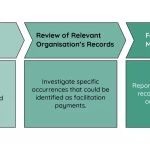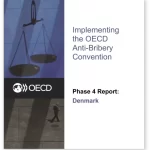Some countries do not consider facilitation payments as bribes. As long as these are not made to earn or keep business, or to create an undue advantage over another company or entity.
In this article, we will be addressing the legality of these payments in the United States, Australia, New Zealand, and the recent developments in South Korea. Do these countries consider facilitation payments the cost of doing business? What does their permission reflect?
1. Facilitation Payments in the United States
In the United States, facilitating payments are allowed when they further a routine governmental action involving non-discretionary acts. Non-discretionary actions are those upon which the government official does not have any decision-making power over the act. For example, an officer from the Department of Motor Vehicles (DMV) cannot decide if he/she can renew your driver’s license. If you meet all requirements by law, the officer must renew it. Therefore he/she has no discretion in the matter. So, it is considered legal in the United States to grant a facilitation payment for an officer to renew a driver’s license.
Moreover, there are two other defenses for bribes in the United States. First, the ‘local law defense’ grants that an act, as a facilitation payment, can be legal locally. However, this defense is rarely used. The second defense is the ‘reasonable and bone fide expenditures’. Such expenses can entail travel costs for foreign officials conducting businesses. This includes airfare, food, lodging and an additional sum for other expenses.
2. Facilitation Payments in Australia
In Australia, facilitation payments are recognized as a complete defense to the core foreign bribery offense in the Criminal Code Act 1995. The Australian government permits these payments when they are of minor sums. Also, when they are deployed to expedite or secure a routine government action of a minor nature. Additionally, the government requires a record of the incident after a facilitation payment occurred.
In 1997 the Australian government took a stand against the OECD’s rejection of facilitation payments. Australia claimed OECD does not prevent member countries from allowing a defense for facilitation payments. Furthermore, Australia denoted that small facilitation payments do not necessarily retain business or allow other improper advantages. Therefore, in their point of view, facilitation payments cannot be seen a form of bribery.
3. New Zealand
Similarly, New Zealand’s foreign bribery offense contains a narrow exception for payments made to a foreign public official. However, this is for the sole or primary purpose of ensuring or expediting the performance of a “routine government action”.
In order to be considered legal, facilitation payments need to be minor and within the scope of the government official’s duties. Such a ‘routine government action’ does not include a decision to create a new business, continue existing businesses or decide the terms for new or current businesses. Moreover, a facilitation payment is allowed when it does not grant an undue material benefit or disadvantage to those involved.
4. South Korea
In South Korea, facilitation payments to domestic public officials are no longer permitted under the Criminal Code. South Korea’s Foreign Bribery Prevention Act (FBPA) used to permit them, but in October 2014, the permission was abolished. This came as a response to criticism from companies that these payments should be eradicated.
South Korean anti-corruption laws have no minimum threshold for bribes. In some instances, small gifts to public officials can constitute bribes under the Criminal Code. Gifts are only legal if they are is within the type of gifts that are customarily given under a specific context. It also legal to grant an officer a gift due to a personal relationship.
What can we conclude about facilitation payments in these countries?
One of the first conclusions we can draw is that facilitation payments are allowed when they are of a minor nature, and when they are connected to minor processes. As explained, these are non-discretionary acts upon which the government official has no authority over the act. In this rationale, discretionary acts would be more vulnerable to bribery. After all, conducting a payment to an official with power over a decision could constitute an attempt to get an undue advantage. This could equate to paying this officer to decide in your behalf. Therefore, the countries discussed above do not necessarily connect these payments to corruption, as long as the sums or gifts granted are of a small amount. In this perspective, facilitation payments are seen minor costs to expedite services.
However, many companies over the world frown upon facilitating payments and their additional risks of bribery and fraud. Because of this, corporate governance cultures have increasingly recognized these payments as forms of corruption. Therefore, allowing them is inconsistent with international anti-corruption practices. Facilitation payments should not be seen as the costs of doing businesses, as they open the door to more offenses. At FAFPI, we believe facilitation payments are a sign of corruption, as they can provide officers an opportunity to make an unregistered income. If such an income is easily achieved, this can encourage officers to request larger sums or gifts. Corruption occurs when advantages are sought after, and when misdeeds go unpunished. This in turn fosters an even more corrupt environment.
Do you think facilitation payments should be legal or illegal? Share your opinion with us in the comments. Join our fight against facilitation payments today. Let’s put a dent in corruption together.







